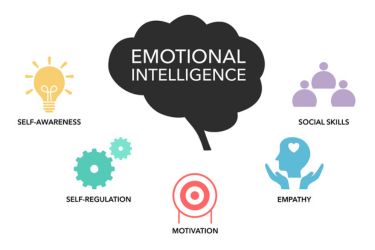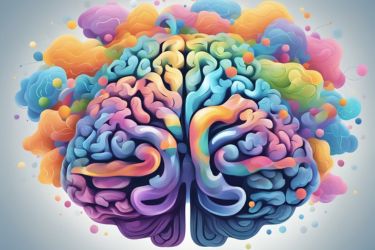In today's workplace, strong professional relationships can make a significant difference in our success and overall job satisfaction. By developing our emotional intelligence (EI), we can cultivate better connections with colleagues and enhance our communication. Boosting our emotional quotient (EQ) not only improves collaboration but also fosters a supportive work environment where everyone can thrive.

Key figures like Daniel Goleman, Peter Salovey, and John Mayer have stressed the importance of emotional intelligence in various settings. They highlight that self-awareness, social skills, and emotional regulation are crucial for navigating workplace dynamics. By focusing on these aspects of EI, we can effectively manage our emotions and respond to the feelings of others, leading to stronger, more productive relationships at work.
As we explore strategies to enhance our emotional intelligence, we will discover practical tips and activities that can seamlessly fit into our daily routines. These insights will empower us to improve our interpersonal effectiveness and create a more harmonious work atmosphere for our team.
Understanding Emotional Intelligence

Emotional intelligence (EI) plays a crucial role in how we navigate our professional relationships. By developing key components such as self-awareness and social skills, we can foster a positive work environment. This section explores the essential foundations and components of EI.
Foundations of EI: Theories and Models
Emotional intelligence is built on several theories, with Daniel Goleman's model being one of the most recognised. Goleman identifies five key elements: self-awareness, self-regulation, motivation, empathy, and social skills.
Understanding these foundations helps us grasp how we perceive and respond to our emotions. Other models, like Mayer and Salovey’s, emphasise the ability to recognise, understand, and manage emotions in ourselves and others.
These theories guide us in enhancing our EI, which can lead to better decision-making and improved workplace relationships.
Components of EI: Self-Awareness and Self-Regulation
Self-awareness is the first step in developing emotional intelligence. It allows us to recognise our emotions and understand how they affect our behaviour. By being aware of our feelings, we can make more informed choices.
Self-regulation follows self-awareness and involves managing our emotions in a healthy way. This includes staying calm under pressure and handling stress effectively. By practising self-regulation, we can respond appropriately in challenging situations rather than reacting impulsively.
Together, these components form a strong foundation for improving our emotional intelligence at work.
Social Skills and Social Awareness at Work
Social skills are vital in creating effective workplace relationships. Strong social skills help us communicate clearly and collaborate effectively with our colleagues. This includes active listening, which fosters understanding and trust.
Social awareness entails recognising the emotions of those around us. It helps us respond appropriately in interactions, whether during team meetings or one-on-one discussions. By developing empathy, we can understand our co-workers' perspectives and collaborate more successfully.
Together, social skills and awareness enhance our ability to connect with others, ultimately leading to a more harmonious work environment.
Emotional Intelligence in the Workplace

Emotional intelligence (EI) is crucial in shaping how we interact with colleagues and manage teams. It affects workplace dynamics, enhances collaboration, and improves leadership effectiveness. By understanding and applying emotional intelligence, we can create a more connected and productive environment.
The Role of EI in Workplace Dynamics
Emotional intelligence plays a significant role in workplace dynamics. It helps us recognise our own emotions and those of our colleagues. This awareness allows us to respond appropriately to various situations, fostering better communication.
Key components include:
- Self-awareness: Understanding our feelings and impacts on others.
- Self-regulation: Managing emotions in stressful situations.
- Empathy: Recognising how others feel and responding supportively.
When we enhance our EI, we build trust, reduce conflicts, and create a supportive culture.
EI and Teamwork: Enhancing Collaboration
In teamwork, emotional intelligence is essential for collaboration. It helps us appreciate diverse perspectives and manage interpersonal relationships. Team members with high EI can navigate conflicts and maintain harmony.
Important aspects of EI in teamwork include:
- Active listening: This fosters understanding and validates feelings.
- Open communication: Sharing feelings and thoughts encourages transparency.
- Shared goals: Aligning on objectives strengthens commitment.
When we focus on EI, our teams become more cohesive. We achieve better results and a positive work atmosphere.
Leadership and EI: Directing with Empathy
Effective leadership is deeply connected to emotional intelligence. Leaders with high EI demonstrate empathy, which enhances their ability to motivate and guide teams. This approach fosters loyalty and encourages open dialogue.
Key leadership strategies using EI include:
- Showing appreciation: Recognising employees’ contributions boosts morale.
- Providing constructive feedback: Focusing on growth helps develop skills.
- Encouraging personal development: Supporting career goals shows commitment to team members' success.
Leaders who practice EI create an environment where everyone feels valued and heard. This not only enhances team performance but also strengthens organisational culture.
Applying Emotional Intelligence to Professional Growth

Emotional intelligence plays a vital role in enhancing our professional relationships, managing conflicts, and advancing our careers. By developing our emotional skills, we can work more effectively and create a positive work environment.
Strengthening Work Relationships through EI
Building strong relationships requires understanding and empathy. We can use emotional intelligence to read social cues and recognise the feelings of our colleagues. This awareness helps us respond appropriately in conversations.
By actively listening and showing genuine interest, we foster trust and rapport. Simple actions, like giving positive feedback or celebrating others' achievements, can strengthen our connections.
A supportive work atmosphere encourages collaboration, leading to improved teamwork and shared success. We can also practise self-awareness, reflecting on our own emotions and behaviours, which helps us interact better with others.
Conflict Management and Resolution Skills
Conflict is a natural part of any workplace. With emotional intelligence, we can approach conflicts with a level head. First, we should strive to recognise our own emotional responses and those of others involved.
This awareness allows us to address issues calmly and constructively. We can use skills like active listening and assertive communication to express our thoughts and feelings.
Moreover, seeking common ground is essential. We should aim to understand differing perspectives and work together to find a solution that satisfies everyone. This process not only resolves conflicts but also strengthens relationships.
Career Advancement with EI
Emotional intelligence can significantly influence our career growth. By developing our EI, we enhance our ability to navigate professional challenges and seize opportunities.
Employers value candidates who can manage their emotions and understand others. This quality can set us apart during job interviews or promotions. We should focus on improving our self-regulation and adaptability, as these traits reflect strong leadership potential.
Networking is another crucial aspect of career advancement. Our emotional intelligence enables us to connect with others, making a lasting impression. Building these connections often leads to mentorship opportunities, professional guidance, or new job openings, aiding our career trajectory.
Improving Job Performance and Satisfaction

Emotional intelligence (EI) plays a crucial role in enhancing job performance and satisfaction. By understanding our emotions and those of our colleagues, we can create a more productive and engaged workplace.
EI's Impact on Personal Productivity
When we develop our emotional intelligence, we often see a boost in personal productivity. Self-awareness allows us to recognise our strengths and weaknesses, leading to better task management.
Being in tune with our emotions helps us identify when we are feeling overwhelmed or stressed. This awareness lets us take breaks and recharge when necessary.
Additionally, strong social awareness assists us in navigating workplace relationships. Understanding our colleagues’ emotions can improve collaboration, reduce conflicts, and increase overall efficiency.
Motivation and Job Satisfaction: An EI Perspective
Emotional intelligence significantly influences our motivation and job satisfaction. When we empathise with others, we foster a supportive environment, which can encourage team members.
Being able to understand and manage our emotions helps us handle setbacks more effectively. This resilience can enhance our sense of accomplishment and satisfaction in our work.
Moreover, recognising the emotional needs of our colleagues can lead to stronger workplace connections. When we build these relationships, it often results in higher motivation levels for everyone involved.
In short, nurturing our emotional intelligence can lead to improved performance and greater job satisfaction for ourselves and our teams.
Coping with Challenges: Emotional Intelligence in Action
We can enhance our coping strategies in the workplace using emotional intelligence. By focusing on stress management and adaptability, we can navigate challenges more effectively.
Stress Management and Developing Resilience
Effective stress management is vital for maintaining our emotional health. We need to identify stressors quickly and develop methods to cope with them.
- Recognise Stressors: Knowing what triggers our stress helps us to prepare and respond.
- Practice Mindfulness: Techniques like deep breathing or meditation can help centre our thoughts.
- Set Boundaries: Limiting our workload prevents overwhelm and burnout.
Building resilience helps us bounce back after setbacks. We should focus on problem-solving rather than dwelling on negative emotions. This proactive approach allows us to see challenges as opportunities for growth.
Adaptability in a Changing Work Environment
Adaptability is key in a fast-paced work environment. When we face unexpected changes, maintaining our emotional reactions is crucial.
- Stay Open-Minded: We should embrace new ideas and approaches. Flexibility can lead to innovative solutions.
- Collaborate Effectively: Engaging with our colleagues can provide support and insight during transitions.
- Continuous Learning: Seeking training and development opportunities keeps our skills relevant.
By developing our adaptability, we can better handle rapid changes and contribute positively to our teams. This approach not only enhances our workplace relationships but also boosts our overall performance.





















